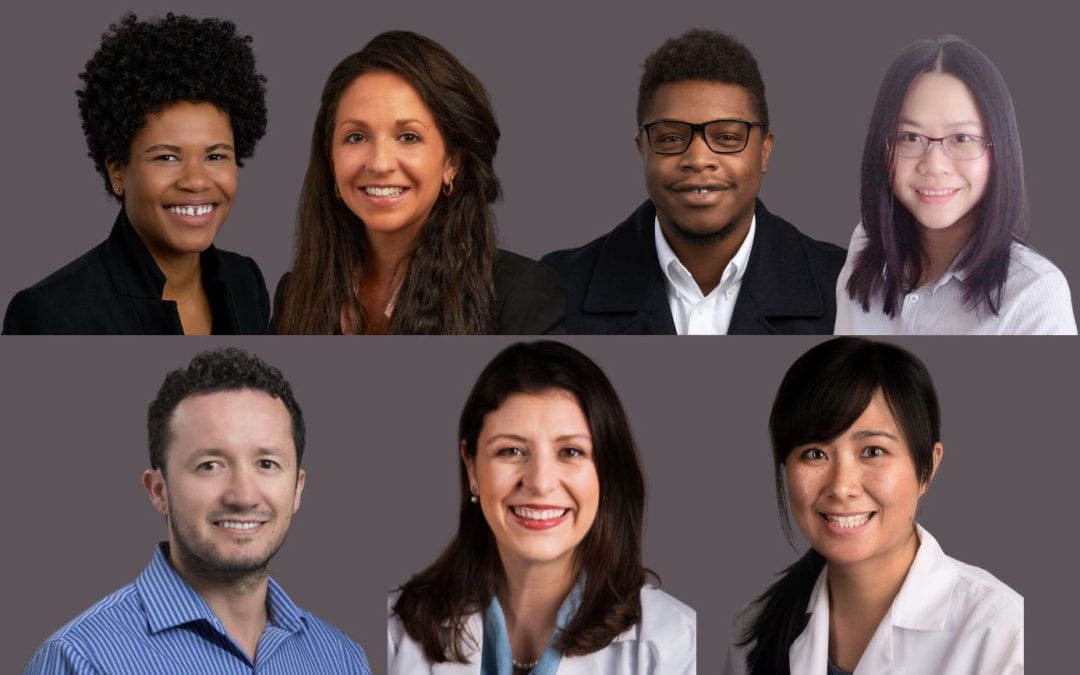Congratulations to Cycle 2 C3EN Pilot Awardees Rachel Boutté, Kirsten Dickins, Chuka Emezue, Li-Ting H. Longcoy, Sarah Sobotka, Elizabeth Tung, and Fabian Sierra-Morales!
C3EN Pilot Awardees receive up to $60,000 in funding to obtain data to establish an NIH-funded program of health disparities research. Awardees also receive mentorship from experienced investigators in the C3EN Investigator Development Core and access to the research infrastructure at both University of Chicago and Rush University Medical Center. Learn more and apply for a Pilot Award.
RACHEL BOUTTÉ, PhD, M Div, Assistant Professor at Rush Medical College
HEAL (Health, Equity, and Longevity)- Development of a Gendered Race Related Stress Intervention
HEAL is a culturally tailored intervention to address unique challenges for Black women’s body image (such as hair and body shape concerns) by including active coping strategies to manage barriers at the intersection of gendered racial identity and physical activity. The aim of this work is to reduce racialized body image dissatisfaction and assess whether a reduction in racialized body dissatisfaction is associated with increases in physical activity.
KIRSTEN DICKINS, PhD, AM, APRN, FNP-C, Assistant Professor at Rush University College of Nursing
A pilot randomized controlled trial of an adapted trauma-focused intervention for Black women experiencing homelessness who use substances
This project centralizes Black women experiencing homelessness, who are historically and presently marginalized from intervention co-design and implementation, while addressing racial trauma as a primary driver of health disparities in Chicago. This adapted intervention will incorporate elements of past trauma treatment and religious/spiritual strengths-based coping skills building to multimodally address mechanisms underlying co-morbid post-traumatic stress disorder and substance use, aimed to promote long-term housing sustainability.
CHUKA EMEZUE, PhD, MPH, MPA, CHES, Assistant Professor at Rush University College of Nursing
BrotherlyACT: Bettering Violence-Related Outcomes Using Technology for Empowerment, Risk Reduction, and Life Skills Coaching in Youth
Young Black males are a priority population for multiple forms of youth violence. This includes fighting, bullying, dating violence, threats with weapons, and firearm-related homicides. Despite this burden on individuals and society, young Black males on high-risk developmental paths continue to face significant challenges to obtaining and engaging with primary prevention, treatment, and recovery programs. There is a critical need for trauma-focused interventions addressing the combined effects of trauma and violence among young Black males to improve psychological and clinical outcomes while broadening access to prevention services. In this proposal, we will 1) Investigate and characterize patterns and determinants of culturally relevant coping strategies among violence-involved young Black males in Chicago and examine how they relate to help-seeking, service access, and utilization. 2) Develop and evaluate the feasibility of a culturally relevant coping-focused module targeting avoidant coping among young Black males at risk for youth violence as part of the BrotherlyACT intervention. BrotherlyACT is a culturally congruent and technology-enhanced skill-building and service-engagement intervention to reduce the risk and effects of youth violence and substance use among low-income, young Black males (ages 15-24) and to improve their access to affirming and humanizing community-based resources. This innovative study co-locates vital resources within one intervention and shifts the current approach from telling young Black males ‘why’ they must change to showing them ‘how.’
LI-TING H. LONGCOY, PhD, DrPH, RN, Postdoctoral Fellow at University of Illinois, Chicago
Development of a culturally tailored resilience-building intervention to facilitate advance care planning discussions between Chinese American patients and their family caregivers.
This pilot study will use the first phase of the multiphase optimization strategy (MOST) to develop a culturally resilience-building intervention. Through this intervention, Chinese Americans and their family caregivers may be equipped with the resilience skills necessary to sustain engagement in advance care planning discussions.
FABIAN SIERRA-MORALES, MD, Assistant Professor at Rush Medical College
Neurologic Outcomes and Health Care Barriers in Patients with Multiple Sclerosis in Chicago
We aim to Identify the barriers and the impact of insurance coverage on multiple sclerosis outcomes in Chicago. This is the first step to develop community-partnered interventions that reduce disparities in multiple sclerosis care and improve health outcomes.
SARAH SOBOTKA, MD, MSCP, Assistant Professor of Medicine at the University of Chicago
Disparities in Home Nursing and Hospital Length of Stay for Children with Invasive Mechanical Ventilation: Identifying National Trends and Piloting a Parent-to-Parent Intervention
Children with invasive home mechanical ventilation (iMV), most of whom are survivors of extreme prematurity, have prolonged hospitalizations due to shortages of home health nurses. Preliminary data suggest that Black and Hispanic children have more prolonged hospital stays. We aim to (1) describe these trends in a national Medicaid dataset and (2) pilot a parent-to-parent coaching model for families to support parent self-advocacy for home nursing.
ELIZABETH TUNG, MD, MS, Assistant Professor of Medicine at the University of Chicago
Legal Care to Mitigate Health Risks for Caregivers of Violently-Injured Youth
This pilot study leverages a hospital-based legal intervention—that addresses social and economic needs during violence recovery—to strengthen family networks and mitigate health risks at a critical transition point in the life course. The long-term objective is to inform evidence-based solutions that reduce minority health disparities for families with long-term historical and structural barriers to accessing legal systems and economic entitlements.
Learn more about current Pilot awardees and their projects. Learn more and apply for a Pilot Award.

